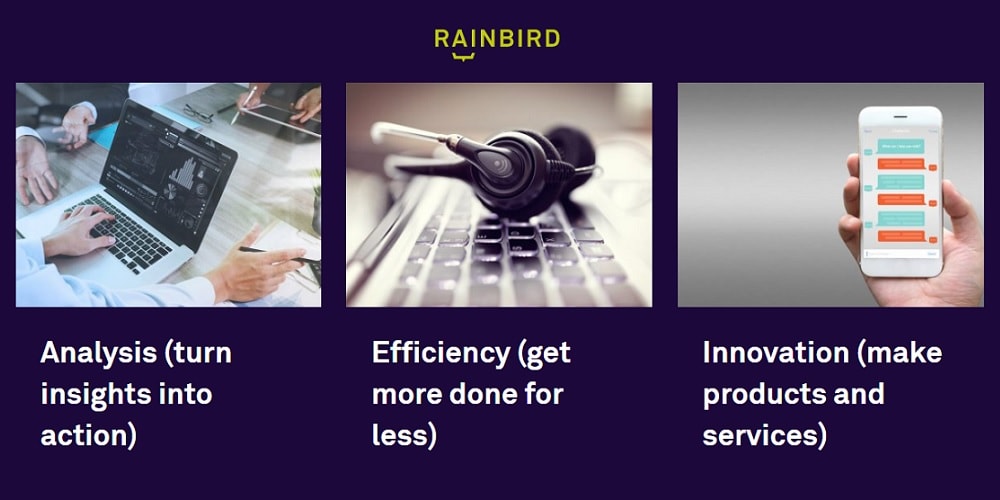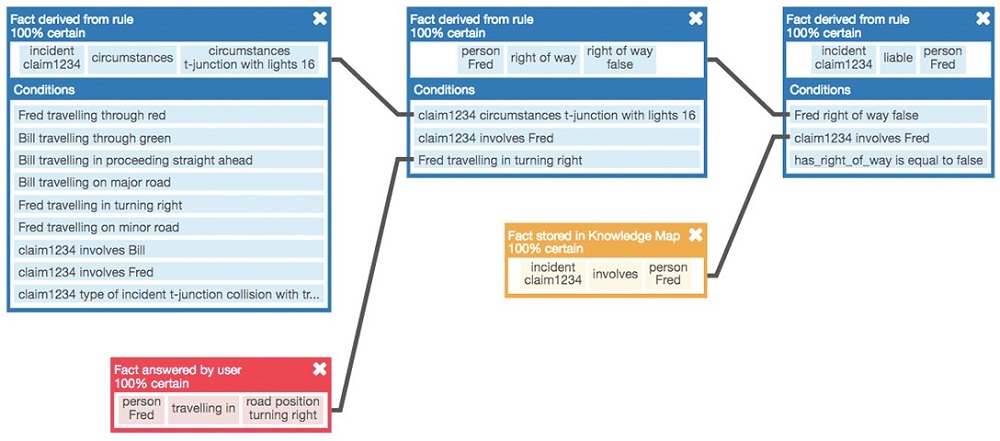Rainbird AI replicates the human judgement process and handles uncertainty and ambiguity just like an expert would. It also has an open-architecture so it can be easily integrated with other solutions and APIs. Because Rainbird seeks missing data, it is a great engine to drive really smart consultative chatbots. If Rainbird needs more information to make a judgement, it simply asks the user for it, and is capable of doing so in any language. To find out more we sat down with James Duez, Co-founder & Chairman at Rainbird:

Q: What’s Rainbird’s story, how did you start?
A: My business partner (Ben Taylor, an ex-Adobe AI Computer Scientist) and I founded Rainbird in 2013 in response to some shared experiences. We met at a previous start-up I co-founded where we developed an AI platform which saved British Insurers tens of millions each year by spotting manipulation, fraud and collusive behaviours in motor claims.
Despite being a successful business, it took dozens of engineers to build such systems. It is often difficult to get data from experts into software, a task known as knowledge engineering – insurance experts are not programmers and programmers do not care much for insurance experts. Getting the two to work together has always been hard.
So, having successfully exited that business, we recognised the growing demand for a reasoning engine that any business could use to scale complex decision making. What was missing in the market was an AI platform that started with human knowledge, not just data – and a platform that business people could use, not just software developers. It needed to be enterprise grade, and capable of being easily connected to multiple data sources and other APIs to make powerful inferences across a combination of human rules and external data flows. It also needed to be able to explain the reasoning for each judgement, so it could be used in regulated industries.
So, we formed a business with that mission, and today Rainbird meets that objective – an inference-based cognitive reasoning engine that makes decisions just like a human, particularly in organisations that need an auditable solution.
In 2015 we were invited by Techstars, one of the world’s leading start-up accelerators, to complete their intensive winter programme, after which the business completed a significant seed raise from investors that included 500Startups.
Since then, it’s been a story of growth. Today, the Rainbird team comprises over thirty members of staff, we have a presence in Norwich and London, and we have just launched through a partner in Hong Kong.
 Recommended: Marketing Agency All Around Creative Helps You Run Successful Inbound Content Marketing Programs
Recommended: Marketing Agency All Around Creative Helps You Run Successful Inbound Content Marketing Programs
Q: What are some of the key features you’re offering to your clients?
A: A lot of the media attention around AI is focused on machine learning, which starts with a large corpus of data. Machine learning has its own advantages, and is great at finding insights that are opaque to traditional data analysis methods – but it is really suited for delivering analysis, not for automating complex decisions.
Our technology is focused on automating decision-making and is a reasoning engine that simulates the human judgement process.
A Rainbird project starts with the modelling of existing knowledge to form what we call a Knowledge Map, a kind of holistic model of knowledge – an ontology that describes a business domain. This map contains probabilistic rules and connections to any number of external data sources.
Unlike a decision tree which is very limiting, a Rainbird Knowledge Map can be used to solve hundreds or thousands of different queries. When you query a Rainbird Knowledge Map (typically via an API or a chatbot interface like Slack, Alexa or Google Home), Rainbird uses this combination of knowledge and data to solve your question, often asking for missing data.
Whereas other solutions tend to be ‘data up’, Rainbird’s methodology is ‘human down’, meaning that, instead of starting with large data sets, Rainbird uses a combination of human expertise and data to make judgements – with an audit trail.
Quite often the expert knowledge in a business is confined to just a few individuals. Our technology can liberate this expertise and combine it in a computer model, where everyone in the company can apply it in the context of their specific tasks. This ‘scaling up’ of business knowledge makes everyone in an organisation as good as the very best individuals, transforming efficiency. If all the data is to hand, Rainbird can make completely automated decisions, for example a fraud or loan approval judgement.
Q: You’ve recently announced $2.89m in Angel Round; could you tell us something more?
A: Yes – we recently closed a £2.2m seed round from a syndicate of investors, including Eden Rock. These funds have enabled continued investment in the Rainbird platform and they also help to fuel the company’s international expansion. We’re able to to deploy effective cognitive reasoning models in a matter of weeks, and the strong interest we’ve had from investors is testament to our success.
 Recommended: Strongarm Delivers High-Value Cybersecurity Services Tailored For Small And Mid-Sized Businesses
Recommended: Strongarm Delivers High-Value Cybersecurity Services Tailored For Small And Mid-Sized Businesses
Q: How exactly do you utilize AI?
A: As I’ve mentioned, a lot of the media attention is focused on machine learning, which has its own considerable advantages, but what we do is slightly different. Rainbird is a cognitive reasoning engine.
I’ll give you a recent example: we’ve been working with an international bank to help them improve customer service interactions by creating a Rainbird-powered consultative chatbot for their advisors to use. This single system can answer over 240 different lines of questioning, and consult with staff in the context of their customer’s specific enquiry. This was achieved by collating and harnessing employee knowledge and modelling it in Rainbird. The outcome is an improved consistency in customer advice, ensuring that problems are resolved quickly, and first time.
Rainbird has also helped to prevent ‘knowledge leakage’, a typical challenge that comes with the natural turnover of staff. Embedding knowledge in systems is a powerful way to prevent the business from losing expertise, and enables new joiners to become fully functional much more quickly.
Q: What are your plans for the next 6-12 months?
A: Rainbird already has a rapidly growing team of software engineers and consultants, working with select partners to help large organisations solve some of their biggest challenges. Rainbird is knowledge-agnostic, but most of our projects are in the financial services, banking, insurance and law because these are heavily regulated industries and Rainbird can provide an audit trail for automated advice. That said, Rainbird is increasingly being explored for clinical diagnostic and healthcare use-cases.
We are looking to branch out into international markets during the next year. Our team recently attended the Hong Kong AI Summit, and we have partnered with JOS – one of Asia’s leading providers of IT services and solutions, and a division of the Fortune Global-500 listed Jardine Matheson Group – to bring Rainbird’s innovative solutions to Asia. We are now working in the Asian automotive industry, developing a solution with a client to help improve customer experience in their service department.
We also have aspirations to launch Rainbird in the US soon and will be attending the AI Summit in New York in December.
Last Updated on October 22, 2017
Activate Social Media:


